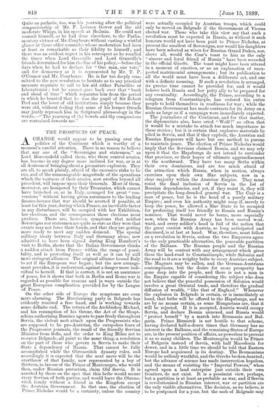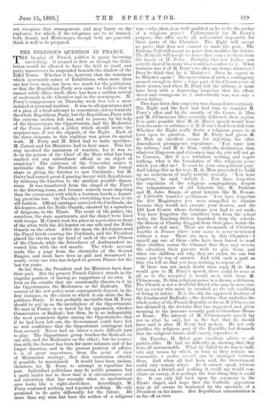THE PROSPECTS OF PEACE.
ACHANGE would appear to be passing over the politics of the Continent which is worthy of a moment's careful attention. There is no reason to believe that any one of the "Sovereigns and statesmen," as Lord Beaconsfield called them, who there control armies, has become in any degree more inclined for war, or is at all desirous of bringing about a premature explosion. They are all, to speak plainly, afraid of the excessive risks to be run, and of the unmanageable magnitude of the operations which the vastness of their armies, now swollen beyond all precedent, will impose upon their Generals. Most of them, moreover, are hampered by their Treasuries, which cannot have launched or, as in Italy, arranged for great " con- versions " without having given assurances to the leading finance-houses that war should be averted if possible, at least for this year, during which France, an inevitable factor in any disturbance, will be occupied with her Exhibition, her elections, and the consequences those elections must produce. There are, however, symptoms that neither Sovereigns nor statesmen are quite so sure as they were that events may not force their hands, and that they are getting more ready to meet any sudden demand. The special military treaty between Italy and Germany alone, now admitted to have been signed during King Humbert's visit to Berlin, shows that the Italian Government thinks a sudden attack from France within the range of possi- bility, and is protecting itself as well as it can by still more stringent alliances. The original alliance bound Italy to act if the European war began ; but the new arrange- ment provides, it is understood, against a danger more indi- vidual to herself. If that is correct, it is not an assurance of peace, for it shows that both in Berlin and Rome war is regarded as possible for reasons and in ways outside the great European complication provided for by the League of Peace.
On the other side of Europe the symptoms are even more alarming. The Russianising party in Belgrade has evidently received a free hand, and is working towards SODle definite end. The return of the Archbishop Michael, and his resumption of his throne, the Act of the Skupt- schina authorising Russian agents to pass freely throughout Servia, the violent mob attack upon the Progressists who are supposed to be pro-Austrian, the outspoken fears of the Progressist journals, the recall of the friendly Servia.n Minister from Sofia, and the order to King Milan not to re-enter Belgrade, all point to the same thing, a resolution on the part of those who govern in Servia to make their State a dependency of Russia. That cannot be fully accomplished while the Obrenovitch dynasty rules, and accordingly it is expected that the next move will be the overthrow of that family, now represented by a boy of thirteen, in favour of the Prince of Montenegro, who would then, under Russian protection, claim Old Servia. It is asserted by those on the spot that this bribe would secure every Servian of both parties, and would leave the Obreno- vitch family without a friend in the Kingdom except the Austrian Government. In that case, the election of Prince Nicholas would be a certainty, unless the country were actually occupied by Austrian troops, which could only be moved on Belgrade if the Government of Vienna elected war. Those who take this view say that such a revolution must be expected in Russia, as without it such honours would not have been paid to Prince Nicholas, at present the smallest of Sovereigns, nor would his daughters have been selected as wives for Russian Grand Dukes, nor, above all, would the Czar's toast to him as the only "sincere and loyal friend of Russia" have been recorded in the official Gazette. The toast might have been uttered in a moment of emotion, or as an explanation of unex- pected matrimonial arrangements ; but its publication to all the world must have been a deliberate act, and one with a definite meaning. If such a revolution is arranged, its precise time cannot be provided for, and it would behove both Russia and her petty ally to be prepared for any eventuality. Accordingly, the Prince, according to a telegram from Constantinople, has ordered his entire people to hold themselves in readiness for war ; while the Russian Government has made contracts for its Army on a scale as large as if a campaign were immediately expected. The journalists of the Continent, and for that matter, the diplomatists also, have cried "Wolf !" so often that it would be a mistake to attach too much importance to these stories ; but it is certain that explosive materials lie piled in Servia, and that if they explode, the Austrian and Russian Emperors will have but one method to pursue to maintain peace. The election of Prince Nicholas would imply that the Servians claimed Bosnia, and we may rely upon it that the Hapsburgs do not intend to surrender that province, or their hopes of ultimate aggrandisement to the southward. They have too many Serbs within their own dominions, and are too much afraid of the attraction which Russia, when in motion, always exercises upon their own Slav subjects, now in a clear majority within the Austrian Empire. They must resist the final inclusion of Servia in the list of Russian dependencies, and yet, if they resist it, they will precipitate the long-dreaded general war. The Czar is a man of peace, but he is the head of a purely military Empire ; and even his authority might snap if, merely to keep the peace, he allowed a Slav State to be occupied for professing itself too friendly to Russia and Russia's nominee. That would never be borne, more especially now, when the Russian Army has been moved west- ward, and every soldier's head is full of the notion that the great contest with Austria, so long anticipated and discussed, is at last at hand. War, therefore, must follow on a revolution in Servia, unless the two Emperors agree to the only practicable alternative, the peaceable partition of the Balkans. The Russian people and the Russian Army will be content with any arrangement which gives them the land-road to Constantinople, while Salonica and the road to it are a weighty bribe to every Austrian subject. The Magyars may be sullen, and the German-Austrians contemptuous, but the desire for more prosperity has gone deep into the people, and there is not a man in the Empire capable of considering the subject who does not believe that the peaceful possession of Salonica would involve a great Oriental trade, and therefore the gradual diffusion of wealth, "like that of England." Whenever the explosion in Belgrade is certain, or is immediately at hand, that bribe will be offered to the Hapsburgs, and we are by no means certain, as some Hungarians are, that it will be rejected. If it is accepted, Austria would occupy Servia, and declare Bosnia annexed, and Russia would "protect herself" by a march into Roumania and Bul- garia. Prince Bismarck is not hostile to that scheme, having declared half-a-dozen times that Germany has no interest in the Balkans, and the remaining States of Europe are, in the present position of affairs, as powerless to prevent it as so many children. The Montenegrin would be Prince of Bulgaria instead of Servia, with half Macedonia for dower, and in a little time we should be told that Eastern Europe had acquiesced in its destiny. The Roumanians would be sullenly wrathful, and the Greeks broken-hearted; but the advance of science has made insurrection hopeless, and the means of resisting the "Imperial Powers," when agreed upon a land enterprise just outside their own frontiers, do not exist. It is a pessimist view, perhaps, but a partition is at least as probable as war, and if Servia is revolutionised in Russian interest, war or partition are the only visible alternatives. The decision, as we believe, is to be postponed for a year, but the mob of Belgrade may not recognise that arrangement, and may hurry on the explosion, for which, if the telegrams are to be trusted, both Russia and Montenegro, though both are peaceful, think it well to be prepared.



































 Previous page
Previous page